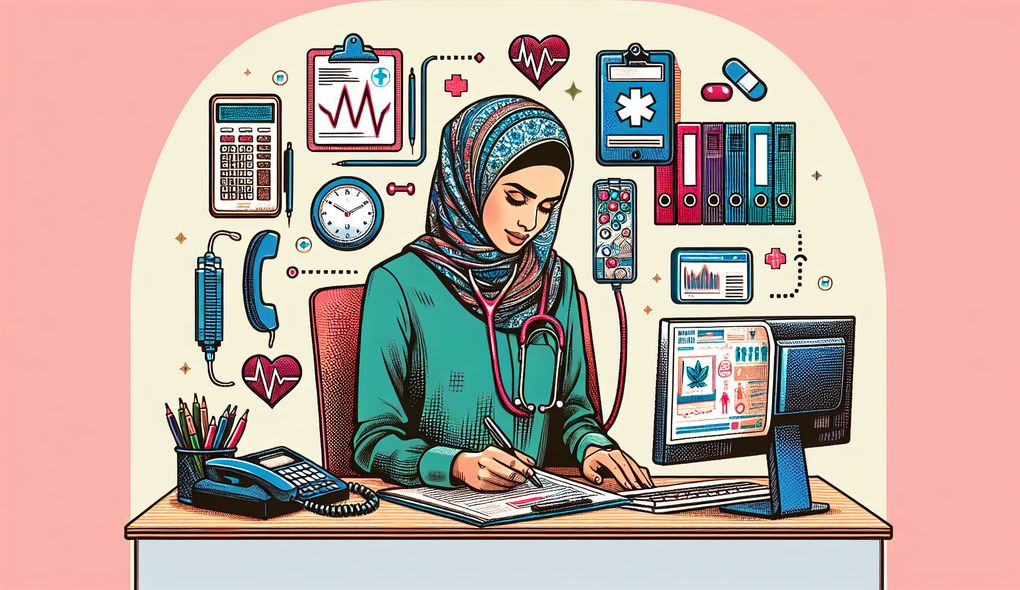How do you prioritize your tasks and manage your time effectively?
SENIOR LEVEL

Sample answer to the question:
To prioritize my tasks and manage my time effectively, I start by making a to-do list in the morning and categorize tasks based on urgency and importance. I then tackle the most critical tasks first and break down larger tasks into smaller, manageable steps. I also use a calendar or planner to set deadlines and allocate specific time slots for each task. Additionally, I minimize distractions by turning off notifications and setting aside dedicated focus blocks. Finally, I regularly assess my progress and make adjustments as needed.
Here is a more solid answer:
As a medical receptionist, prioritizing tasks and managing time effectively is crucial for maintaining a smooth workflow. To achieve this, I start each day by reviewing the schedule and identifying urgent appointments or procedures. I then prioritize tasks such as patient check-in, scheduling follow-ups, and processing insurance paperwork. I use a color-coded system to categorize tasks based on their urgency and importance. For example, red for immediate attention, yellow for important but not urgent, and green for tasks that can be done later. This helps me stay focused and ensure that critical tasks are addressed promptly. I also utilize electronic scheduling and reminder systems to set alarms for upcoming tasks and deadlines. By constantly reassessing my workload and adjusting priorities as needed, I can effectively manage my time and ensure that all tasks are completed in a timely manner.
Why is this a more solid answer?
The solid answer demonstrates a clear understanding of the specific tasks and responsibilities of a medical receptionist. It provides specific examples and details that showcase the candidate's ability to effectively prioritize and manage tasks in a medical setting. However, it could be improved by including more information on how the candidate organizes and delegates tasks.
An example of a exceptional answer:
As a seasoned medical receptionist, I have developed a highly effective system for prioritizing tasks and managing my time. Firstly, I start each day by reviewing the appointment schedule and identifying any urgent or time-sensitive tasks. I then create a detailed to-do list, organizing tasks based on their urgency, importance, and estimated completion time. This allows me to focus on critical tasks that require immediate attention. To avoid becoming overwhelmed, I break down larger tasks into smaller, more manageable steps. For example, when processing insurance paperwork, I divide the process into individual tasks such as verifying coverage, submitting claims, and following up on any discrepancies. Additionally, I utilize a digital calendar and task management software to set reminders and deadlines. This helps me stay on track and ensure that no task falls through the cracks. Furthermore, I regularly communicate with the medical staff to coordinate tasks and delegate responsibilities when necessary. By collaborating with my colleagues, we can ensure that all tasks are efficiently completed. Lastly, I continuously evaluate and re-prioritize tasks as new information or emergencies arise, ensuring that I can adapt to changes in the workflow. With this comprehensive approach, I can effectively prioritize my tasks and manage my time in a fast-paced medical setting.
Why is this an exceptional answer?
The exceptional answer goes above and beyond in demonstrating the candidate's ability to prioritize tasks and manage time effectively. It includes specific examples and details that showcase the candidate's experience and expertise in managing tasks in a medical receptionist role. It also highlights the candidate's ability to adapt to changes in the workflow and effectively collaborate with colleagues. The answer is comprehensive and demonstrates a deep understanding of the responsibilities and challenges of the role.
How to prepare for this question:
- Familiarize yourself with the appointment scheduling process in a medical setting. Understand the importance of prioritizing urgent appointments and procedures.
- Learn about the common tasks and responsibilities of a medical receptionist, such as patient check-in, scheduling follow-ups, and processing insurance paperwork.
- Develop a system for organizing and categorizing tasks based on urgency, importance, and estimated completion time. This can include color-coding or using a digital task management system.
- Practice breaking down larger tasks into smaller, manageable steps. This will help you stay focused and ensure that complex tasks are completed efficiently.
- Consider how you can effectively collaborate with medical staff and delegate tasks when necessary. This demonstrates your ability to work as part of a team and optimize workflow.
- Be prepared to provide specific examples of how you have effectively prioritized tasks and managed your time in previous roles. Highlight any challenges you faced and how you overcame them.
What are interviewers evaluating with this question?
- Time Management
- Prioritization
- Organization

